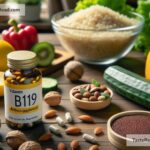The Role of Vitamin B12 in Metabolic Health: Why It Matters
Vitamin B12 is an essential nutrient that your body needs to stay healthy. It is a water-soluble vitamin, which means your body doesn’t store it for long. You have to regularly get it from foods or supplements. Among its many important functions, Vitamin B12 plays a critical role in supporting your metabolic health. In this article, we’ll explore what Vitamin B12 does, why it’s important, and how you can ensure you’re getting enough of it.
What Is Vitamin B12?
Vitamin B12 is also called cobalamin. It’s part of the B-vitamin family, a group of nutrients that help your body turn food into energy. Unlike some other vitamins, B12 is unique because it can only be found naturally in animal-based foods like meat, fish, eggs, and dairy. Some plant-based foods like cereals and plant milks are fortified with B12, making them a good source for people on vegetarian or vegan diets.
Your body uses Vitamin B12 for many essential processes, such as making red blood cells, protecting your nerves, and helping your DNA stay healthy. Without enough Vitamin B12, your body can struggle to perform these functions, which can lead to health problems.
Why Is Vitamin B12 Important for Metabolic Health?
Your metabolism is the process by which your body converts food and drinks into energy. Every cell in your body needs energy to work properly, and Vitamin B12 plays a key role in making sure this process runs smoothly. Here are the main ways Vitamin B12 supports metabolic health:
1. Energy Production
Vitamin B12 works with other B vitamins to help your body convert carbohydrates, fats, and proteins into energy. Specifically, it is involved in breaking down molecules in your cells and helping them produce energy properly. If you are deficient in B12, your body may struggle to make energy efficiently, which could leave you feeling tired and sluggish.
2. Red Blood Cell Formation
Red blood cells carry oxygen to every part of your body. Vitamin B12 helps in the production of red blood cells, which are essential for delivering the oxygen your cells need to produce energy. Without enough B12, your body can’t produce healthy red blood cells, which leads to a condition called anemia. People with B12 deficiency anemia may feel weak, dizzy, or tired because their body isn’t getting enough oxygen.
3. Nervous System Health
Your nerves act like communication highways, sending signals throughout your body. Vitamin B12 helps maintain the health of the protective coating around your nerves, called the myelin sheath. A healthy nervous system is essential for metabolic processes like muscle movement, digestion, and maintaining a healthy heart rate. Low levels of B12 can damage your nerves, potentially causing numbness, tingling, or other symptoms.
4. DNA Synthesis
Vitamin B12 plays an important role in creating and repairing DNA, the blueprint for your cells. Healthy DNA allows your cells to function correctly and divide as needed. Proper DNA synthesis ensures that your body has the right building blocks for a healthy metabolism.
What Happens When You Don’t Get Enough Vitamin B12?
Vitamin B12 deficiency can affect your metabolic health in many ways. Over time, low levels of B12 can lead to serious health problems, including:
- Fatigue: Your body struggles to produce energy efficiently, leaving you feeling tired all the time.
- Nerve Damage: B12 deficiency can lead to nerve problems, such as tingling or numbness, especially in the hands and feet.
- Memory Problems: Low levels of B12 can impact brain function, leading to memory problems and difficulty concentrating.
- Anemia: Without enough B12, your body can’t produce enough healthy red blood cells, leading to symptoms like weakness and shortness of breath.
- Mood Changes: Vitamin B12 is important for brain health, and its deficiency may contribute to anxiety, depression, or irritability.
Older adults, vegetarians, and people with certain medical conditions, such as stomach or intestinal problems, are at a higher risk of Vitamin B12 deficiency. If you’re experiencing symptoms of B12 deficiency, it’s important to talk to your doctor.
How Can You Get Enough Vitamin B12?
The good news is that getting enough Vitamin B12 is often straightforward. Here’s how:
1. Animal-Based Foods
If you eat animal products, foods like meat (especially beef liver), fish (such as salmon and tuna), eggs, and dairy are excellent sources of Vitamin B12.
2. Fortified Foods
For people on plant-based diets, fortified cereals, plant milks, and nutritional yeast can provide the B12 you need.
3. Supplements
Vitamin B12 supplements come in various forms, such as pills, lozenges, and even injections for those with severe deficiencies. They are a great option if you’re not getting enough B12 from food.
4. Eating a Balanced Diet
Having a balanced diet that includes a variety of foods is one of the best ways to ensure you get all the nutrients your body needs, including B12.
Conclusion: A Small Nutrient, Big Impact
Vitamin B12 is a small but mighty nutrient that plays an essential role in keeping your metabolism—and your entire body—healthy. From producing energy to maintaining your nerve and red blood cell health, B12 is crucial for helping your body function at its best. If you think you might not be getting enough Vitamin B12, consider eating more nutrient-rich foods or talking to your doctor about supplementation. By prioritizing your Vitamin B12 intake, you’ll be taking an important step toward better metabolic health and overall well-being.


